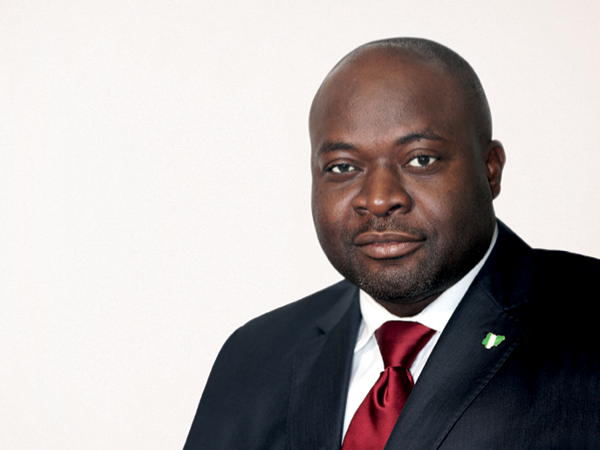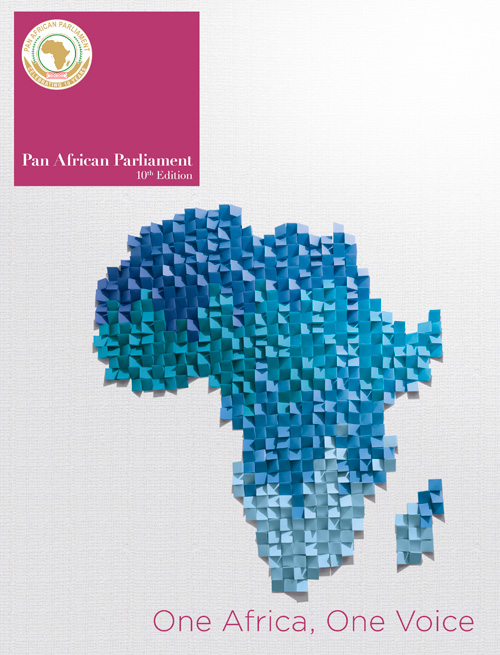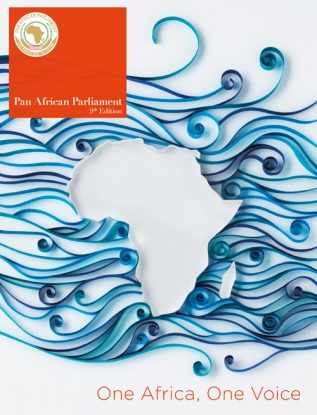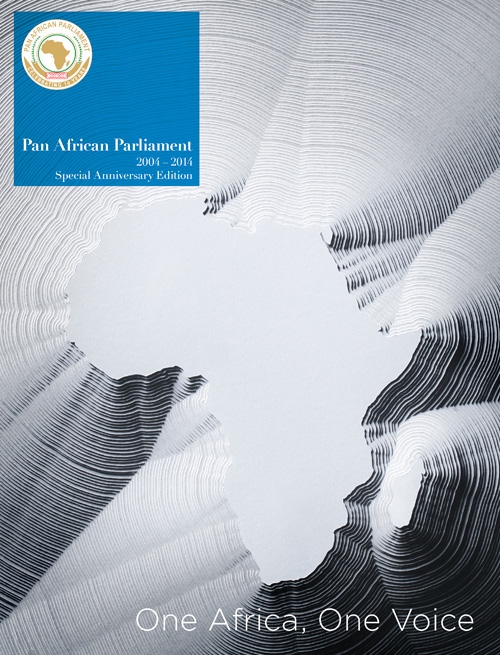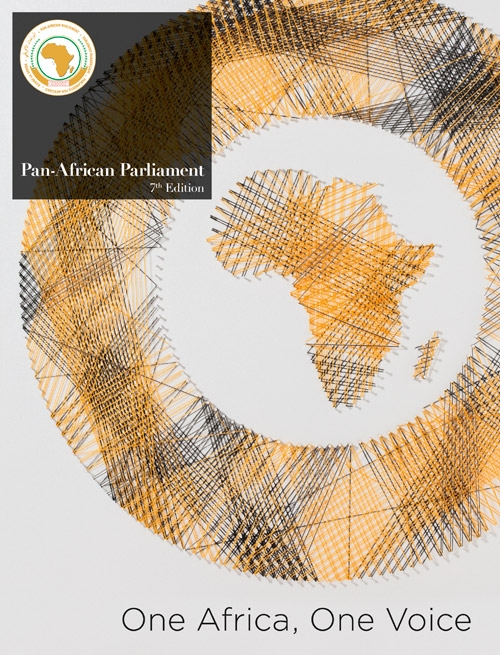
The establishment of the Pan African Parliament is informed by a vision to provide a common platform for African peoples and their grass-roots organisations to be more involved in discussions and decision-making on the problems and challenges facing the continent. The Pan African Parliamentarians represent all the peoples of Africa.
The PAP was built from nothing into a formidable institution with the capacity to organise its organs and operations. Over its 10-year-period of existence, the Parliament has made huge strides. After the initial phase of a five-year-term, the First Parliament paved the way for the Second Parliament on 28 May 2009. The Second Parliament operated for a three-year-term and ushered in the current and Third Parliament, consequently changing the Office Bearers (the Bureau) through transparent and free elections. Therefore, the PAP has led by example by changing Office Bearers democratically as need arises. The Parliament established the 10 Permanent Committees, which are functional.
The vision of the Parliament is to be a continental institution harnessing ‘One Africa, One Voice’. Over the last 10 years, the PAP has created women, youth and civil society platforms to ensure that voices of ordinary peoples are mainstreamed into its policy monitoring function.
The PAP has driven awareness about the need for Member States to ratify, domesticate and implement treaties, conventions and decisions entered into by the AU. The Parliament has been organising conferences and meetings in the five regions and the annual Speakers’ Conference as a way of engaging stakeholders on these issues.
The PAP was built from nothing into a formidable institution. Over its 10-year-period of existence, the Parliament has made huge strides
The Draft Protocol on the establishment of the PAP was recently considered in Malabo, Equatorial Guinea, at the 23rd Summit of Heads of State and Governments. The Draft Amendments were adopted by the AU Heads of State and Governments.
The Protocol aims to transform the PAP into a legislative body. The Draft Protocol still requires ratification by 27 Parliaments to make it effective. The adoption of the Draft Amendment means that the PAP has commenced the process of transforming itself into a legislative body. The PAP will request its Members of Parliament to advocate for the ratification by Member Parliaments.
It is hoped that by June 2015, the requisite number of ratifications will have been deposited with the AU Commission to enable it to come into force by July 2015.
Once this is done, the PAP will henceforth have the ability to contribute meaningfully to the economic integration process of the continent by providing the necessary legislative mechanism and framework.
The legislative powers assigned to the PAP will enable it to make policy frameworks on transcontinental issues such as the free movement of people, goods and services across Africa; the harmonisation of instruments adopted by the AU to achieve integration and promote Shared Values; policy frameworks on illicit financial flows and taxation systems; and harmonisation of intra-African trade, to mention a few.
The PAP will also effectively undertake its monitoring and oversight role over continental policy issues such as the AU Agenda 2063; the Joint Africa-Europe Strategy; the Millennium Development Goals (MDGs) implemen-tation; the ratification and domestication of all AU instruments and the AU budget.
In terms of institutional capacity building, the PAP has made a lot of progress. The PAP developed a model that has become the basis for overseeing AU organs through the alignment of its committees with the AU Commission departments. The PAP website, which shares information with the public, was launched at the Third Ordinary Session in March 2005. Further PAP presence and opportunity for online engagement with citizens was created through Facebook and Twitter in 2013. The PAP has been working on raising its visibility through various means. This includes the establishment of a media centre, which is now fully functional and used by media houses for interviews and dissemination of PAP proceedings during the sessions.
The main focus in this decade has been governance. The PAP has campaigned to ensure that the African Charter on Democracy and Governance (ACDEG) is a step towards deeper democratisation of the continent. The main goal of the ACDEG is the encouragement and promotion of democracy and human rights throughout the African continent. It’s the first binding regional instrument adopted by AU Member States that attempts to comprehensively address all of the elements necessary for the establishment of liberal democracies.
Elections observation or monitoring is an integral duty of the PAP, embedded in its objectives of promoting human rights and democracy; promoting peace, security and stability; and encouraging good governance, transparency and accountability in Member States.
Even in the combined elections-observer missions, the PAP does not shy away from formulating indepen-dent positions, making recommendations to contribute to the strengthening of democracy and stable govern-ance on the continent.
With 240 members, the PAP has the capacity to make a real difference to enhance governance in Africa
In this regard, the PAP jointly observes elections with the AU Commission. To date, the PAP has observed elections in many countries throughout Africa and produced reports for consideration by Heads of State and Governments. In 2014 alone, the PAP participated in the AU election-observer missions in Guinea-Bissau, Algeria, Malawi, South Africa and Egypt. In the area of peace and security, the PAP has undertaken oversight missions with the objective of promoting sustainable peace. The PAP has been influential in raising awareness on the Western Sahara issue.
In accordance with Article 3 Objective 1, the PAP is to ‘facilitate co-operation among Regional Economic Communities (RECs) and their parliamentary fora’. The PAP has, therefore, been organising regional meetings to engage with Regional Parliamentary Foras (RPFs) and Regional Economic Communities (RECs) on issues of integration, harmonisation and AU instruments’ ratification and domestication.
On relations with National Parliaments, the PAP embarked on organising and hosting annual conferences of Speakers of National Parliaments and Senates, and those of the Parliaments of RECs. The first conference took place on 8 and 9 October 2009 in Midrand, South Africa.
As an organ of the AU that offers a platform for the African peoples and organisations to actively address issues faced by the continent, the PAP has involved and engaged with the civil society organisations on a number of issues in various meetings at the PAP precincts and in regional meetings.
The PAP is determined to grow the culture of demo-cracy on the African continent, and measures its success by the number of countries without conflicts of such nature. Education, healthcare and gender inequality have taken a back seat in Africa, and this needs to be seriously addressed by all role players. The time has come for the PAP to make a more meaningful contribution to the needs of Africa.
The PAP remains optimistic that with 240 members, it has the capacity to make a real difference to enhance governance in Africa.
The biggest challenge facing the PAP is one of relevance and legitimacy as it grapples to truly become a people’s organisation. Currently most people in Africa do not understand the role and functions of the PAP.
In line with its drive to raise awareness for the need for Member States to ratify, domesticate and implement treaties, conventions and AU decisions entered into by the organisation, the PAP organises conferences – including that of the Speakers – and meetings on an annual basis.
The question is often asked of how the PAP is working towards fulfilling the AU’s Agenda 2063 vision. The PAP is a parliamentary body and its role in Agenda 2063 is limited to ensuring that Member States honour their commitments in terms of budgeting and implementing development programmes. Parliamentarians play a key role in making sure accountability to people is central to the post-2015 MDGs accountability mechanism, with transparent targets and measurable results.
Policy frameworks and instruments are in place to achieve the Agenda 2063 objectives, several of which offer tremendous opportunities in terms of eradicating poverty, promoting justice and realising political, econo-mic and social rights in Africa.
Apart from ratification, the main challenge remains the domestication and implementation of these key instruments at national levels, making the role of National Parliaments in their promotion an imperative.
There remains an alarming gap between AU legal instruments and policy standards and the policies and practises of most Member States. Unless there is a change in the behaviour of both AU organs and Member States, many important decisions being taken at continental levels are in danger of not being implemented. This will continue to have devastating consequences for the millions of African citizens denied good governance, fundamental freedoms and basic human rights. It will also further expose Pan-African institutions to an obvious credibility challenge.
The PAP’s role in Agenda 2063 is to ensure that Member States honour their commitments in terms of budgeting and implementing development programmes
Next year sees the deadline of the MDGs. Many African countries are unlikely to achieve the goals by 2015, especially in fragile and conflict-affected areas. A transformative agenda must be pursued, not only for Africa but the rest of the world too. The new development framework should carry forward those MDGs that are still relevant to today’s world, including issues that perpetuate poverty, deforestation, land degradation, desertification and loss of biodiversity, and climate change.
Ongoing interventions must be upscaled to meet the 2015 MDGs deadline, with the new development frame-work sustained by credible national ownership and leadership. Climate change must be at the forefront of Africa’s concern. The continent must adapt its production structures to take advantage of the green and blue economy route with transformation opportunities for low energy, low carbon and clean technology for development.
The resilience of rural communities must be increased so that they can cope with climate change and extreme weather events. African countries must invest in critical agents of change – small producers, traders, family farmers, fisheries, livestock keepers, forest users, rural workers and indigenous peoples. Entrepreneurs should be encouraged to invest in agriculture and rural development.
In recent years the AU has pushed for African solu-tions to solve the continent’s problems, including in the security sector. While this approach has yielded many successful results, conflict and instability in some parts of Africa still remain. Conflicts impede economic and social progress, aggravate human conditions and exacerbate poverty.
Good governance and institutional capacity are essential for peace and stability – reliable government and social systems are critical to resolving social unrest and discontent. State and society must have measures for resolving disputes, such as judicial systems and mediation capacities.
In terms of the post-2015 agenda, it’s important to mainstream the complex nexus between peace, security and development, and that it capitalises on the synergies between the three dimensions. In countries struggling or recovering from conflict, the development community’s efforts must address not only peace and security, but development as a key driver of peace too.
The PAP will continue to support African peace and security initiatives.


